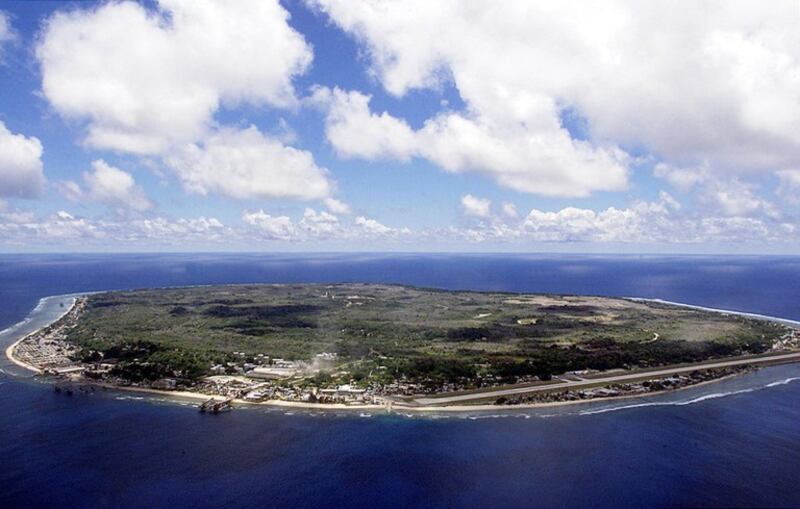The home in an exclusive Bangkok residential compound popular with diplomats was rented ostensibly by the tiny Pacific island nation of Nauru for its consul-general to Thailand, his family and staff.
But Onassis Dame, the Nauruan diplomat, and his family did not live there.
Instead the residence, which investigators raided on Dec. 22, was used as a base for forging passports by foreigners including two Chinese nationals wanted by Beijing, Thai police have said.
Dame’s whereabouts as well as his and the Nauru consulate’s role, if any, in the passport mill are unclear. According to the Thai police, the illicit operation forged Chinese and Nauru passports.
Dame’s term as consul-general had expired in November, Pol. Gen. Surachate Hakparn, Thailand’s deputy national police chief, told a press conference on Monday.
The consulate entered into the property lease in early September when Dame still headed it, according to a legal letter on behalf of the leasing company, a copy of which RFA-affiliate BenarNews obtained.
“If the consul-general told the Chinese to stay [at the property], he is taken as supporting the Chinese. If so, he was at fault. But it will be based on the investigation,” Surachate said.
An employee at Nauru’s consulate in Thailand said on Tuesday that Dame had been recalled – a term that can cover various scenarios including the scheduled end of a posting, a diplomat’s poor behavior, or a government wanting to convey its displeasure with the host country.
Thailand’s Diplomatic and Consular List shows that Dame became consul-general in October 2019.
Nauru’s vice-consul, John Yu, didn’t respond immediately to emailed questions.
On Wednesday, the consulate employee said that consulate officials were busy with the situation involving Dame and the rented residence. An official at Nauru’s Government Information Office said they had no information about the case.
An Onassis Dame is also president of the Nauru Judo Association.
Calls to a Thai mobile number for Dame did not connect.

Nauru, northeast of Australia, is the world’s third smallest state by area after the Vatican and Monaco. It is one of only 14 countries that recognizes Taiwan instead of China.
The 21-square-kilometer (eight-square-mile) atoll is pockmarked by a phosphate mining industry that for several decades made Nauru among the world’s richest nations.
The most accessible phosphate is now exhausted and Nauru, home to about 10,000 people, is reliant on aid from Australia, Taiwan and the Asian Development Bank. In 2008, Nauru recognized the breakaway Georgian republics of Abkhazia and South Ossetia in an effort to also secure Russian aid.
Chinese-linked criminality
In Thailand, the passport forgery investigation is the latest in a series of busts of crime rings and unregistered businesses involving Chinese nationals.
The case has also put a spotlight on official corruption as Department of Special Investigation (DSI) officers and other officials who carried out the Dec. 22 raid were arrested in January for taking a bribe from the Chinese nationals and allowing them to escape.
At least 15 officials have been charged with corruption in connection with the case, according to news reports.
On Wednesday, Thai Justice Minister Somsak Thepsuthin signed an order to transfer DSI chief Traiyarit Temahiwong over the scandal, the Bangkok Post reported.
The raided compound, in central Bangkok, is home to luxury homes and high-end apartment buildings with well-tended grounds, swimming pools, and tennis courts connected by a private road.
Property rental sites show a three-bedroom apartment can be had for about 100,000 baht (U.S, $3,036) a month. An eight bedroom three-story house in the compound is listed for 430,000 baht ($13,053) a month.
The constant comings and goings of unregistered vehicles and people, day and night, at the residence rented by Nauru caused concern for neighbors and the compound’s security guards, and eventually led to the Dec. 22 raid.
A Dec. 13 legal letter to Dame on behalf of the company that had leased the property said the lease agreement with the Nauru consulate had been violated.
It said the property had never been used as the private residence of Dame, his three family members and two staff as intended by the agreement signed on Sept. 2 last year.
“There has been an unconventionally high amount of traffic of unregistered vehicles entering and leaving the premises including during an unusual time, without addressing the purpose of the visit,” the letter said.
The security of diplomats who live in the compound was at risk, it said, threatening termination of the lease.
Yu, Nauru’s vice consul, wrote to Thailand’s Department of Special Investigations twice in December – before the raid – seeking its assistance because of concerns about the rented property, according to a DSI statement on Dec. 28.
DSI’s account of Yu’s first letter, dated Dec. 9, indicates that he only recently had become aware of the rented property.
“It [the consulate] also discovered several violations of regulations by allowing Asian individuals, believed to be Chinese nationals, to use the property for purposes other than as the residence of the Consul-General. This might pose risks to international relations,” the statement said.
“All day entries and exits at the property have grown suspicious and disturbing for neighbors, who consist of diplomats from other countries,” the statement said.
Nontarat Phaicharoen in Bangkok contributed to this report.
BenarNews is an RFA-affiliated news service.
